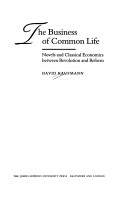"Economics and politics," writes David Kaufinann, "are not the unconscious of the novel, but its internal horizon. The novel, political economics, and the discourse of political theory are all partial solutions to a constellation of similar problems, and each one presents a different description of the human subject and human action. To try to collapse them is to miss the post-Weberian point. They are all limited, all historical, and all absolutely necessary." Deriving his theoretical model from systems theory and the Frankfurt school, Kaufinann argues that the consolidation of economic theory and the critical acceptance of the novel in late Georgian Britain were central to the cultural work of describing and legitimating the commercial state and the society that sustained it. By juxtaposing political texts (from Hume to Mill), moral philosophy, and classical economic theory (from Smith to Mill), and novels by Radcliffe, Austen, Scott, and Shelley, Kaufmann shows how these different discourses worry and attempt to think through the problems of justice and citizenship that mark liberalism and modernity.
- ISBN10 0801849306
- ISBN13 9780801849305
- Publish Date 1 December 1994
- Publish Status Out of Stock
- Out of Print 9 January 2001
- Publish Country US
- Imprint Johns Hopkins University Press
- Format Hardcover
- Pages 224
- Language English
